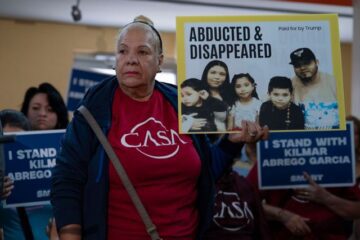By Angie Chuang
Editor’s Note: The Presidential Inaugural Committee announced that poet Richard Blanco was going to be one of five people selected to read an original poem at President Barack Obama’s second-term inauguration. Blanco, 44, was be the first Latino, first openly gay man, and youngest person to serve the role. Blanco, the son of Cuban exiles, joins the ranks of American inaugural poets, which includes legends such as Maya Angelou and Robert Frost.
I did not know it when I walked into the linoleum-lined classroom in 2000. I did not know who Richard Blanco was. I only knew that I was a newspaper reporter in a small post-industrial Connecticut city asked to show up at a poetry reading at the local university to write an aptly named “brief” for the next day’s paper.
I had been working in the suburbs of Hartford for nearly three years, and often spent days in the field seeing no other Asian Americans. New Britain, Connecticut, was the former ball-bearing capital of the United States, the headquarters of Stanley Hardware, where workers turned hard eyes upon me when I was sent to cover a protest against jobs being sent to China.
On some days, white-haired men told me I reminded them of “a lady I met in Dub-ya Dub-ya II.” Or Korea. I answered the question, “Where are you from?” and then, “No, where are you really from?” So many times I gave in and stopped saying, “California” to the first question. Three years removed from my multicultural cocoon of the San Francisco Bay Area, I felt lonely and barraged.
Blanco’s Words Changed Everything
What Blanco said – or rather, read – changed everything.
And that is why the choice of the first Latino and the first gay inaugural poet matters to Asian Americans. To all Americans.
I spoke English; my parents didn’t.
We didn’t live in a two-story house
with a maid or a wood-panel station wagon
nor vacation camping in Colorado.
None of the girls had hair of gold;
When I walked into that classroom at Central Connecticut State University, I was an alien, Other. As Blanco read his poem “América” to a class of mostly white students, I became an “I” again. Sure, Blanco called his grandmother his abuelita and I called mine a pou pou. But the small revelation of recognizing myself in a poet and professor’s words transcended semantics. Blanco wrote:
Patty Duke’s family wasn’t like us either –
they didn’t have pork on Thanksgiving,
they ate turkey with cranberry sauce;
they didn’t have yuca, they had yams.
The poem is about so many things, but the apparent narrative describes an awkward family Thanksgiving that the young Blanco insists on, to the horror of his older Cuban relatives contemplating the turkey (“‘DRY,’ Tío Berto complained”), marshmallow-studded yams and cranberry sauce (“mierda roja,” the same skeptical tío proclaims).
I had done the same in grade school, but my mom only agreed to prepare a single turkey drumstick (in her battered stewpot, not the oven, of course).
“Why would anyone eat a bird so big and so dry?” my parents scoffed as I feigned enthusiasm, feeling more like Wilma Flintstone than a pilgrim. We were descended from those who perfected the art of baking fatty duck to a crisp.
It’s a seemingly small thing, to get sent on a routine reporting assignment and hear a recounting of immigrant Thanksgiving that uncannily resembles one’s own experience. I wrote nothing of the turkey, of the poem, of Blanco’s immigrant roots. I wrote exactly three sentences highlighting an upcoming appearance, the last of which was, “The event is free and open to the public.”
But on that day, I felt a small glimmer of belonging, of resonance, in Connecticut. I reclaimed my first personhood.
Waiting for ‘Post-Racial’ America
So much has changed since then. I was standing among the cheering, freezing masses on the Mall when the first black president was inaugurated in 2008. I waited for the post-racial era to herald in newfound equality.
Instead, we got the birther debate, and gay teenagers driven to suicide by bullying, “self-deportation,” the suicide of Pvt. Danny Chen, a South Asian immigrant pushed off a subway platform by a woman who “hated Hindus and Muslims.” And a socioeconomically and racially divided election that brought Obama back to the White House.
Which brings me back to Blanco. Some have said he’s a savvy political choice, a nod to Latino and gay voters’ overwhelming support of Obama in 2012.
I would argue that come this Monday, Jan. 21, all Americans, not just immigrant Americans, will have been much as I was on that spring day in 2000, entering the classroom in Connecticut: desperate.
We are desperate for the America that Blanco represents, in his poetry, and simply by being who he is.
Where “I” and “we” are inclusive. Where Otherness is layered, complex. Where Otherness is American. Where Americanness is layered and, in Blanco’s words, “love is thicker than any country.”
Angie Chuang is an assistant professor of journalism at American University School of Communication. A second-generation Chinese American, she researches constructions of American identity and Otherness in news media, and writes literary nonfiction about the immigrant experience.
Source: New America Media



